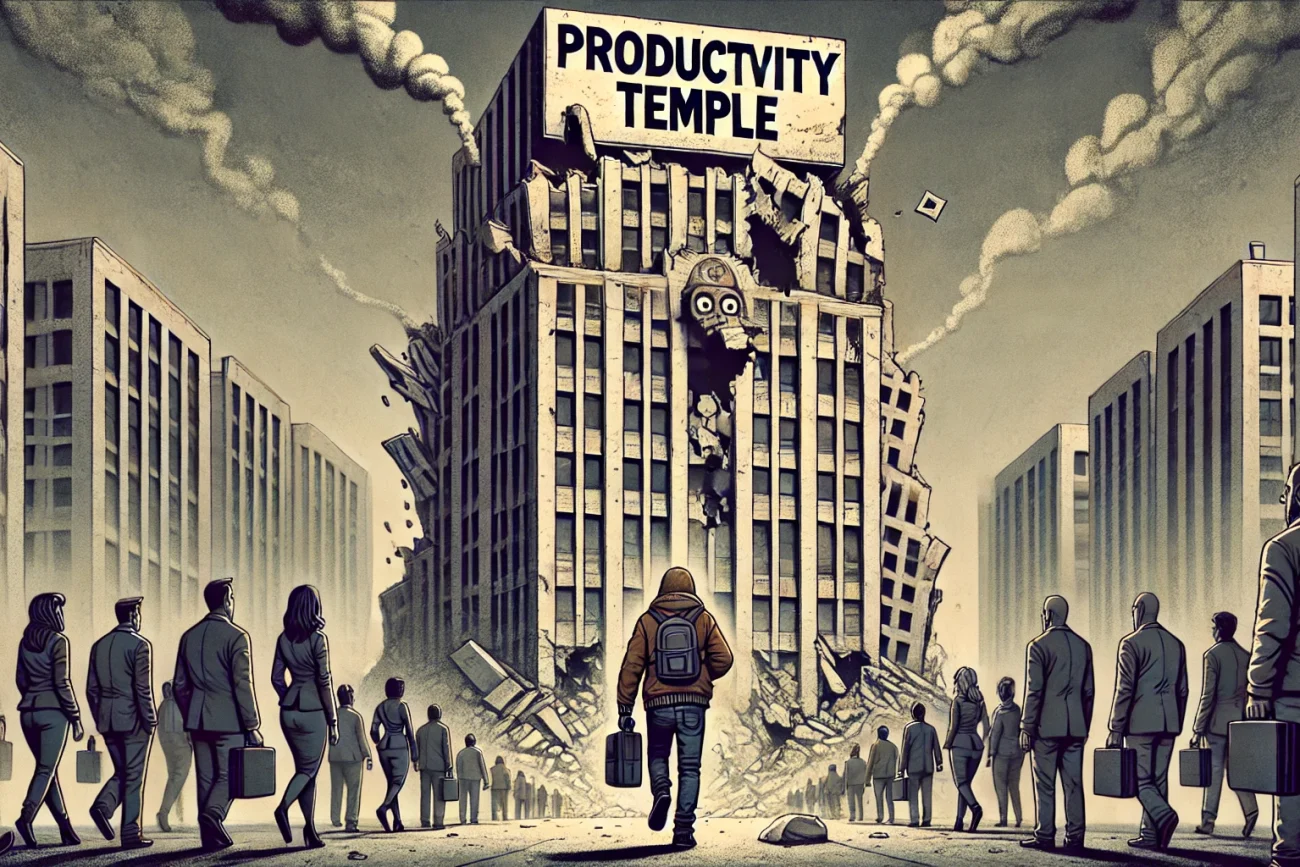A growing number of professionals have left their job without another lined up, directly challenging long-held assumptions about stability, ambition, and success. Traditionally, to quit without a new job was considered reckless, a mark of poor planning or diminished drive. But that narrative is shifting. Increasingly, people are stepping away not in crisis, but with intention; driven by burnout, ethical misalignment, mental health, or the need for clarity that current roles no longer offer.
Despite this trend, the stigma persists. In many industries, leaving your job without a new one remains a red flag to employers and peers alike. Phrases like “left job without a plan” or “quit job without a new opportunity” are still interpreted as signs of instability. The job market, while more flexible than ever, often continues to reward continuity over courage.
This article explores the deeper dynamics behind this emerging pattern. It examines how culture, hiring practices, and individual psychology intersect in the decision to leave a job without a safety net. It also offers a reframing: perhaps the power lies not in clinging to uninterrupted employment, but in reclaiming agency—even if it means stepping into uncertainty.
"Sometimes the most strategic move in your career isn’t moving forward. It’s knowing when to stop."
Employment as Social Validation: The Semiotics of Being “In a Role”
To be employed is to be visible, vetted, and validated. When someone is actively in a role, it signals that an organization has assessed their value and made an affirmative choice to keep them. This status becomes a kind of shorthand in professional spaces, particularly in hiring. The presence of a current job reduces perceived risk. It tells recruiters that someone else has already deemed the candidate capable, stable, and trustworthy.
When someone has left a job without another role secured, that validation is temporarily withdrawn. Suddenly, the absence of employment creates an interpretive gap. It invites questions, sometimes quietly loaded: Why did they leave? Were they let go? Can they handle pressure? These aren’t always asked explicitly, but they linger at the edges of the hiring process.
To quit without a new job is to challenge one of the strongest heuristics in recruiting. It disrupts the clean narrative of linear, uninterrupted professional growth. In doing so, it exposes a deeper truth: many organizations are not solely evaluating skills, experience, or potential. They are reacting to perceived momentum. Being “in a role” is often mistaken for being effective, when in reality, it may reflect nothing more than inertia.
Professionals who have left their job without a plan must often work harder to justify their decision, even when it reflects strategic thinking or a commitment to long-term alignment. This dynamic reveals a hidden conservatism in hiring cultures. Employers may say they value innovation and self-awareness, but structurally, they often prioritize familiarity and continuity. The result is a system that penalizes thoughtful pauses while rewarding those who stay in motion, regardless of direction. As this pattern becomes more visible, it invites a reevaluation of what professional validation truly means.
Power and Perception: How Leaving a Job Without a New One Affects Negotiation Leverage
One of the most persistent critiques of leaving your job without another lined up is the perceived loss of negotiating power. Conventional wisdom holds that candidates with current employment are in a stronger position. They are seen as less desperate, more desirable, and better able to walk away from an unattractive offer. The assumption is clear: employment equals leverage.
But this idea is often rooted more in status dynamics than in any real market logic. A candidate who has quit without a new job may, in fact, possess greater clarity, purpose, and self-awareness—qualities that signal long-term potential and leadership readiness. These individuals have chosen intention over inertia. They are not reacting to crisis, but taking control of their trajectory.
Still, biases persist across the hiring landscape. A candidate who has left a job without a plan may be offered a lower salary or a narrower role under the assumption that they will take whatever is available. This presumption can subtly shape everything from job descriptions to interview tone. Employers, whether consciously or not, may interpret the absence of employment as a vulnerability to be leveraged.
In this context, narrative becomes essential. Those who quit without a new job must reframe the career pause as a deliberate act. Rather than justify, they must clarify: a decision made not from weakness, but from strength. Whether it’s stepping away from a toxic culture, prioritizing mental health, or taking time to reassess long-term goals, these explanations can reposition the candidate as proactive and values-driven.
When presented with confidence and transparency, this move can become a strategic differentiator. It reveals a professional unafraid to prioritize alignment over optics—an increasingly rare and valuable trait in a world where too many stay simply because they’re afraid to leave.
The Suspicion of Unstructured Time: Why Career Gaps Still Trigger Doubt
To quit without a new job is not just a career decision; it is a confrontation with deeply embedded beliefs about time, productivity, and social worth. In most modern work cultures, time is not neutral—it is moralized. Hours spent in employer-controlled settings are seen as disciplined and purposeful. Time outside that structure, particularly when not tied to formal employment, is often viewed as idle or even suspect.
This framing creates a strong stigma around those who have left their job without a plan. The assumption is that structured employment equals productivity, and unstructured time equals drift. Those who step outside this frame are often asked to justify their decision to pause, reflect, or simply rest.
For individuals, this can have a disorienting effect. Many report a loss of identity and confidence—not because they lack direction, but because society offers few narratives that validate self-directed time. The internalized message is that value comes from being visibly busy.
And yet, leaving a job without another lined up is often when professionals do their most meaningful thinking. It is in these quiet, unprogrammed intervals that people rethink their goals, build new skills, or pursue ideas that full-time roles did not allow. These periods may be filled with growth, but because the outcomes are not immediately legible to hiring systems, they are often discounted as “gaps.”
This reveals a disconnect between how careers actually evolve and how they are evaluated. Resumes and interviews still favor continuity over introspection, even when the latter produces better long-term outcomes. Until hiring cultures adapt to recognize the value of non-linear paths, those who choose to leave their job without a new one will continue to face unnecessary skepticism—despite often returning to the workforce more focused, creative, and resilient than before.
Who Gets to Quit? Class, Culture, and the Privilege of Pause
To leave your job without another job lined up is rarely judged on its merits alone. While it may appear to be a personal decision, the reception of that decision is often shaped by broader structures of class, industry culture, and social capital. In theory, any professional should have the freedom to pause, reflect, or change direction. In practice, not everyone is granted the same permission—or forgiveness—for doing so.
In sectors like tech, the arts, or academia, taking time away from work is sometimes even encouraged. Breaks can be reframed as sabbaticals, creative recharge, or independent research. Within these environments, choosing to quit without a new job may be seen as thoughtful or strategic. However, in more traditional or hierarchical industries such as law, finance, or public administration, the same choice is often viewed with suspicion. There, continuous employment is tightly linked to discipline, ambition, and reliability.
The disparity deepens when class and background are considered. Professionals with degrees from elite institutions, financial safety nets, or influential networks are more likely to receive the benefit of the doubt. Their decision to leave a job without a plan is more easily interpreted as bold or visionary. Conversely, those from working-class or underrepresented backgrounds may be seen as irresponsible or uncommitted for making the exact same move.
This imbalance reveals that quitting without a new job is not just a matter of timing or intention. It is a reflection of who is allowed to take risks, who is trusted to recover, and whose professional agency is respected by the market. Until we address these embedded biases, the freedom to pause will remain unevenly distributed—granted to some as strategy, and questioned in others as failure.
To leave your job without a new one is often seen as a professional gamble, but it may be one of the most underestimated career strategies available today. The assumption that continuous employment is the only responsible path has long shaped hiring decisions and cultural expectations. Yet, that assumption fails to account for the value of stepping back with purpose.
When someone chooses to quit without a plan, it can reflect a desire for realignment rather than a loss of direction. It may signal strength, not instability. A willingness to pause, assess, and pursue a more meaningful trajectory. These choices are often made with clarity, not chaos.
For organizations, this presents an opportunity to challenge outdated metrics of professional value. When hiring managers automatically question those who have left a job without another lined up, they may miss candidates who are clearer, more resilient, and more aligned than those who never stepped off the treadmill.
In today’s fast-evolving work environment, the capacity to reflect and self-direct is increasingly vital. Sometimes, the most strategic move is not to keep going, but to stop with intention. And that kind of decision deserves respect, not suspicion.

